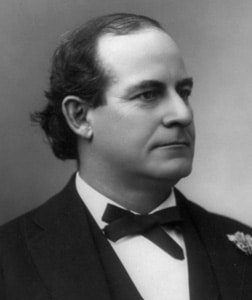Yesterday, the BBC posted a surprisingly tame piece with Donald Trump’s thoughts on music; in it was an admiring reference to Steve Reich’s phase technique. (I first found out about it through a tweet by William Robin.) As others have pointed out, Trump himself probably didn’t write those lines. But it got me wondering. The musical tastes of presidents are well-documented; but what about those who never won? This playlist is dedicated to candidates who never had the honor of serving in a job that the 23rd president, Benjamin Harris, once compared to that of “the policeman at the opera.”
Philip Burgheim – “The Ashland March”

Henry Clay (1777-1852) served in the U.S. Senate and House of Representatives and as Secretary of State, but ran for the presidency three times without winning. Burgheim dedicated this 1843 piano piece to the Whig leader. According to The Papers of Henry Clay, the politician responded by indicating his “acceptance and appreciation of said dedication.” What, if anything, he thought of the music itself appears to be lost to history.

Ken Harrison – How to Play the Musical Saw
In his memoirs, the orator and politician William Jennings Bryan (1860-1925) wrote of his musical upbringing, “I recall that during my early boyhood I expressed a desire to take lessons on the piano. [My father] checked my ambitions in this direction with the brief but firm suggestion that the girls in the family could take lessons on the piano but that the boys would learn to make music with the hand saw…One has only so much time. If it is spent on instrumental music sufficient to become proficient it occupies time that must be taken from other things.” Judging by this tutorial, he wasn’t wrong. Bryan had plenty of time for various pursuits, but still lost three presidential elections.

Charles Ives – “Central Park in the Dark”; Leonard Bernstein (Conductor), New York Philharmonic
In 1928, Al Smith (1873–1944) lost the election to Herbert Hoover, who would go on to be one of the worst presidents in American history. One of his supporters was Charles Ives—“in part,” according to New York Modern: The Arts and the City, “because Smith was a Catholic and a New Yorker.” Perhaps the fact that the famously hermetical, ahead-of-his-time composer was a supporter was a clue that Smith wasn’t a shoo in for the presidency.

Elvis Presley – “It’s Now or Never”
In What Jefferson Read, Ike Watched, and Obama Tweeted Tevi Troy wrote, “In August 1956, as the presidential rematch between Eisenhower and Democrat Adlai Stevenson [1900-1965] approached, Elvis was greeted at the Los Angeles airport by fans waving ‘Elvis for President’ signs. He refused to take the bait, announcing, ‘I’m strictly for Stevenson. I don’t dig the intellectual bit, but I’m telling you, man, he knows the most.’ ” The King’s endorsement didn’t end up saving Stevenson, whose opponent, Dwight Eisenhower had the support of Irving Berlin.

Phi Mu Alpha Sinfonia – “The Star Spangled Banner”
Thomas E. Dewey (1902-1971), of “Dewey Defeats Truman” fame, might have lost the 1948 presidential election, but he was blessed with an outstanding baritone. As a student at the University of Michigan, he was a member of the glee club Phi Mu Alpha Sinfonia. Apparently, he quit singing because he was afraid that a cold could ruin his career. If this makes it seem like he gave up easily, it’s worth remembering that he pursued the New York City mafia as a federal prosecutor.

Herb Alpert and the Tijuana Brass – “Greatest Hits”
Hubert Humphrey (1911-1978) served as Vice President under Lyndon B. Johnson, but lost in the following election cycle to Richard Nixon. According to Carl Solberg’s Hubert Humphrey: A Biography, the lavish 1966 wedding party Humphrey threw for his son Bob included a special appearance by the Tijuana Brass, “a group flown in from California at the Vice President’s special request.”

Frank Sinatra – “You’ll Never Walk Alone (Live at the inauguration of George H. W. Bush, 1989)
Bob Dole (*1923), loser of the 1996 election to Bill Clinton, has a favorite song: “You’ll never walk alone.” In May, Dole endorsed Trump. Depending on what happens within the Republican Party after the elections, he may have to.

Julie Andrews – “The Hills Are Are Alive” from “The Sound of Music”
In 1984, Walter Mondale (*1952) lost 49 out of 50 states to incumbent Ronald Reagan. As Richard Taruskin noted in his essay “The Musical Mystique,” the Chinese government arranged for his favorite songs from “The Sound of Music” to be performed during a 1979 state visit (Mondale was Vice President to Jimmy Carter). You may draw your own conclusions about whether Mondale’s taste for the deeply beloved, deeply reviled musical had anything to do with his historic defeat. ¶









